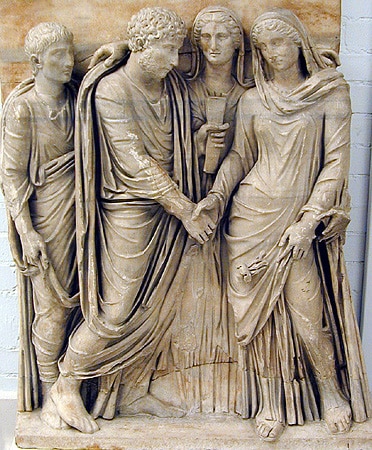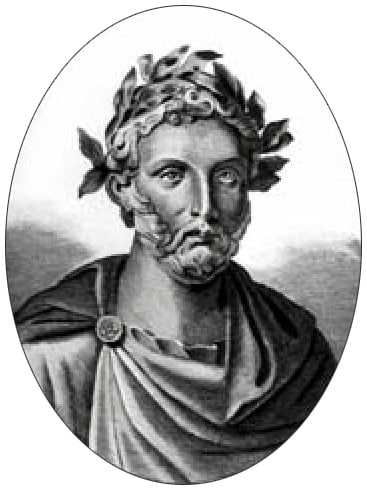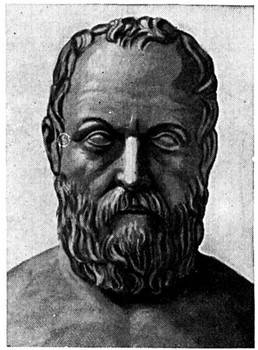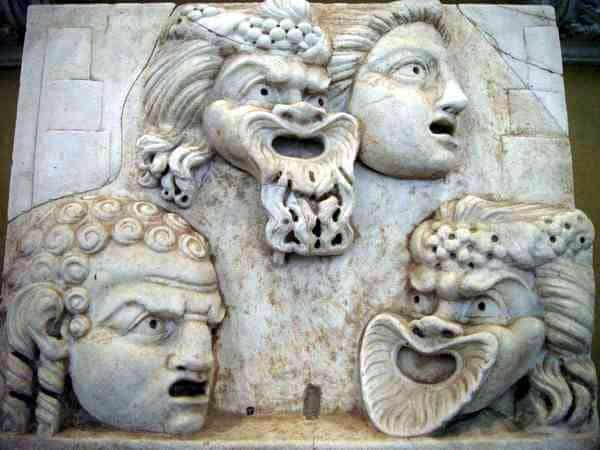- Roman regarded theatre almost as equal as chariot-racing and gladiatorial contests

- The two most popular variations were: Comedy & Tragedy
- Set the foundation for European culture & drama over other forms of ancient entertainment
- Romans were the only people of classical antiquity to adapt Greek literature into their own language
- Originally plays were written in Greek, but later adapted/ written in Latin
- Theatre was not predominantly for a certain class in society; it was for everyone
- Greek cities of southern Italy were also passionate about farces & caricaturing themes
- Common people, freedmen, slaves, and even women could go to the theatre
- “They come to see and to be seen themselves” – Ovid (speaking about attendance to plays)
- Romans didn’t have to travel far to see Greek plays and often took Greek treasures and loot
- Livius Andronicus (Greek), was the first to offer Rome a Latin drama based on the Greek model
- Tarentum = city famous for its dramas
- 240BC= the year Roman literature and poetry was born
- Origins: Etruscan ritual dances combined with improvised Latin texts “satires filled with music” [still lacked the authentic feature of Greek plot]
- Roman Saturnian meter didn’t originally match the sophisticated Greek meter
- “Conquered Greece itself conquered its uneducated conquerors, and brought the fine arts to “Latium” –philhellenic poet Horace [Rome learned from the Greeks it has overthrown]
- Fabulae praetextae, “plays in the praetexta, the purple-bordered toga” [garment of Roman officials] “Roman conquering the Gauls by Naevuis
- Also wrote “comedies in the toga”
- Like Andronicus, he wrote both comedies and tragedies [Greek writers only specialized in one or the other]
- Quintus Ennius of Calabria [three hearts], could speak Oscan, Greek and Latin. Important tragedy writers “O Wonderful Poet” exclaims Cicero a century later about Ennius
- “Let them hate me so long as they fear me” [Used by later Caesars/ Tyrants] from Lucius Accius of Umbria
- Got the point where newer play writers stop making new tragedies/ comedies and reproduced acclaimed masterpieces
- Horace’s Art of Poetry: a thorough study of Greek models would enable them to create a drama suitable for the educated public
- Plays only performed on the occasion of public state games or festivals (in a religious context)
- Writers did not compete with each other in Ancient Rome but with the other forms of entertainment such as chariot racing and gladiatorial contests
- ACCOUNT: During the comedy “The Mother in Law”; hordes of fans stormed the theatre on hearing that tightrope-walkers and boxers wear to appear there later, and fought so ruthlessly for the seats that no one could pay attention to the play
- NO protection of intellectual property in classical antiquity (royalties were rare)
- Only the dramatist made money by selling his play to the company of actors or the manager
- Popularity = Income

- Sileni, half-man/goat= GOD OF WINE
- Unlike other writers who had to be wealthy before they wrote, dramatists were often poor foreigners, not of high social standing
- Naevus was sent to prison for an offending noble families in a comedy. Died in exile
- The lowest reputation of all= actor (earned his money with his body) Roman saw it as a disgrace
- Owner of the actors= “owner of the flock”
- When you became an actor, you became infamis (without honor) but still kept roman citizenship
- Roscius, the only actor of the Republic to move out of the infamis class
- Theatre was not allowed to be built. WHY? Maybe due to national pride, the theatre was still regarded as being Greek, didn’t want to give the impression of being a Greek city
- Pompey would build the first theatre
- Often done in makeshift theatre setups
- Singing and Dancing were often not a large part of tragedy or comedy
- MOST important theatrical innovation was the curtain (sank into a pit in front of the stage
- Scaena= “scene” => audience could tell from sets/ scenery where play was a tragedy or a comedy
- Tragedy (BACKDROP= façade of the royal palace) Comedy (BACKDROP= two or three citizens’ houses)
- HOW PLAYS DIFFERED. NOT by ending but what social class the characters (comedy= ordinary citizens and “mirror” of life. Tragedy= high ranking individuals like princes) wasn’t until the 18th-19th century that this convention was broken by German dramatists
- NO WOMEN ACTORS APPEAR IN SERIOUS ROMAN DRAMA
- Women parts were done by men
- Masks were introduced by Roscius, but Romans missed being able to see changing facial expressions WHY. To hide his face due to his rise in social status to a knight
- Clothing was important for dictating the form of tragedy and comedy
- Plautus/ Terence (20 plays were an important source of comedy) reflections of roman family life
- The performance began with a brief overture played on the tibia (reed instrument)
- The distinction between Roman scenes were not as explicit (didn’t have singing as Greek plays did)

- Introduced at the time of Seneca
- Composers of such music were often slaves
- Homer & Menander [most famous writer of the New Comedy, Athens]= most-read Greek writers in Europe
- Meander, elegant plays and avoided clique, Tyche, goddess of fortune ruled his comical world. Wrote with great warmth for humanity
- Often written about “LOVE” [often young boy in love with a young girl who is a hooker, taken by a man or already married against her will]
- “The Boastful Solider” earliest Latin comedy by Plautus
- Plautus never wrote a play in which the audience gets to identify with two reunited lovers
- Homosexuality was often excluded from Roman plays, but Plautus would joke about it; as well as a range of other smutty jokes not emphasized in the original Greek versions of his remakes
- Romans didn’t yearn for an actual portrayal of Greek life, but one they could relish in and mock
- Greek remakes by Roman playwrights, slaves were given much more empowerment and wit, never done in plays written originally by Romans
- Unlike his predecessors, Platus comedies were almost like musicals, known for his songs, duets, ensembles (on his tomb, it was marked with “unnumbered numbers”, all pitifully lamenting the loss of their great music master.)
- Terence, the successor of Plautus. The same type of characters. Different portrayal. Much less music, much stricter constructs.
- The influx of new Greek education due to the conquering of Macedonia, Greek culture lost its exotic appeal
- Terence was more like Meander in his play construct and features than Plautus
- “he lacked the power of comedy and was only “half” a Menander” –Caesar
- GREAT DIFFERENCE BETWEEN TERENCE AND PLAUTUS. The relationship they try to foster between action on stage and the audience. Terence wanted spectators to identify with his characters and feel moved by them
- Foreshadows, especially in Hecyra (mother-in-law):
- Young husband raped his wife before marriage. The audience discovers this at the SAME time she is pregnant. Only at the end does the young husband discover it was he who raped her while drunk and did not know (found out by the ring, he gave her) [by knowing only as much as the characters, the audience can relate and be sympathetic]
- Adelphoe, most famous Terence play, Eunuchus, most performed play
- Originally roman plays were done in palliatae [CLASSICAL PERIOD]. After the death of Terence, it was done in togata[IMPERIAL PERIOD]
- Master of the togata: Afranius [major theme of his work: mens’ love for boys]
- Atellan farce: Oscan language, four stock characters, with comic names (i.e Maccus, the fool). Soon was performed in Latin by youth
 [NOT a disgrace, all actors wore masks]. Are humorous epilogues to tragedy (satyr)
[NOT a disgrace, all actors wore masks]. Are humorous epilogues to tragedy (satyr) - Minimus: Originally done in Greek. Realistic portrayal of everyday life of the lower classes [i.e Adultery] [attractive women, played the female roles]
- Minimus was soon written in versus and superseded Atellan farce as the comic epilogue to tragedy
- STORY. Syrus challenge all playwrights to improvisation contest. Caesar makes Roman knight Decimus partake. In his performance, he laments about losing his knightship for performing in a play “Citizens, forward! We give up our liberty!”, “He needs must fear many whom many fear!”
- Caesar gave him back his knighthood [such daring statements were allowed in Minimus]
- Pantomime. Most popular stage entertainment in the imperial period. EXPRESSIVE DANCE. The actor was a man, sometimes a woman, dancing solo to poetic text/ different roles. Usually Greek. Started as a comic and evolved to a more serious and tragic
- Pantomimes were very well paid and writers could earn much from selling them plays
- Would have to play several characters. Very expressive arms/ legs. Strict dieting
- Could fill an entire theatre hall and had many young women admirers
- Roman pantomime is not performed by modern dancers
- Seneca. 10 tragedies. One of the major 3 roman dramatists [along with Terence and Plautus]
- Know little about Seneca’s background for his play, despite their strong lasting influence on future literature. He didn’t write for the stage, but for the school of rhetoric. Or perhaps to for public recitations
- Recitations. Acted as a workshop. The author presented a literary piece and got praise or criticism. The author would read their own works and unpublished work was presented
- Though Seneca followed many of the Greek protocols (# of acts, chorus, messengers, characterization) women were used for certain parts
